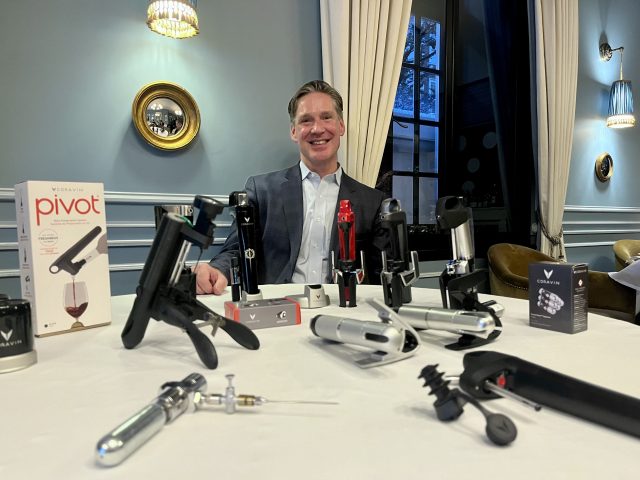Coravin founder wants to revolutionise the way wine is retailed
He managed to change the way somms serve wine in restaurants, and people drink wine at home, now Coravin founder Greg Lambrecht wants to revolutionise the way wine is sold in retail.

His latest aim was revealed at a tasting in London this week, which was held to celebrate 10 years since the launch of Lambrecht’s wine access system, Coravin – a ingenious hand-held device that allows anyone to withdraw wine from a bottle without removing the cork.
And, it was when speaking about his most recent invention, called Vinitas – which has been designed to quickly factionalise wine or spirits into smaller formats – that Lambrecht made the remarks about his hopes for wine retailing in the future.
Commenting that Vinitas was an ideal device for drinks retailers, because it could allow them to sell trial samples to their customers, he said he wanted to see a revolution the way in which wine is sold.
While he commented that the 75cl glass bottle – the standard format for wine – was “wonderful”, he stressed that it doesn’t suit every occasion, particularly times of experimentation.
“We are stuck with 75cl,” he stated, beforme commenting, “which means that you have to pay for a full 75cl bottle, and then, whether you like it or not, you have to drink it all before it oxidises.”
Continuing, he stated, “The revolution that should happen in wine is an easy exploration of wine by the glass at retail, so you have seven different wines from 75cl, instead of [having to buy] one bottle of one wine that you don’t know that you’ll like.”
However, with Vinitas, it is possible for a retailer to take a 75cl bottle of wine and transfer it without exposure to oxygen into a set of 10cl sample vessels, which – if laws allow – can be sold to shoppers as a cheaper way to try new brands and styles.
Lambrecht said that there was a retailer in Australia that was now fractionalising wine and selling it, but such an approach was extremely rare due to “legality issues regarding formats” – with some countries stipulating the sizes of bottle wine can be sold in, while certain wine regions also have rules on formats.
For example, Lambrecht recorded that a Barolo can’t carry the name of the famous appellation if it is sold in a bottle less than 375ml.
Consequently, he concluded, “The most challenging aspect of Vinitas is the legal system.”
Partner Content

As previously reported by db, Vinitas was officially launched in May this year to allow businesses “to fractionalise wine on the fly with a machine only slightly larger than an espresso maker”, according to Lambrecht.
It has taken Lambrecht and his team some time to perfect the system, which is not only automated, but promises to yield 100ml samples with a 12-month shelf-life – “and we are working on making that longer”.
Greg said Vinitas was hard to get right because “wine is an extremely delicate thing, and if you are sending wine through tubes into a container, you need to make sure everything is perfectly clear of any oxygen – anyone can make a system that transfers wine from a bottle, but getting the sample to last for a year is a challenge.”
He also said, “The other challenge was to be as gentle as possible, because wine is fragile, so we had to find the smoothest path we could, which meant taking out any corner edges – the machine’s inner plumbing had to be as straight as possible.”
Having formulated a suitable system, Coravin then spent more than eighteen months testing the Vinitas fractionalisation device with wineries, retailers, and wine schools around the world, with partners including Napa Valley Wine Academy and Langton’s, along with Château Montelena and Stéphane Derenoncourt of Domaine de l’A, among others.
Speaking about formats other than the 75cl glass bottle, Lambrecht said that there were issues with the current solutions on the market, commenting that wine “eats through” the plastic liner in aluminium cans, while it “oxidises” if it’s stored in bags.
Read more
Coravin launches single-serve wine system for businesses
Related news
Ricky Gervais demands Barossa red on his tour rider




